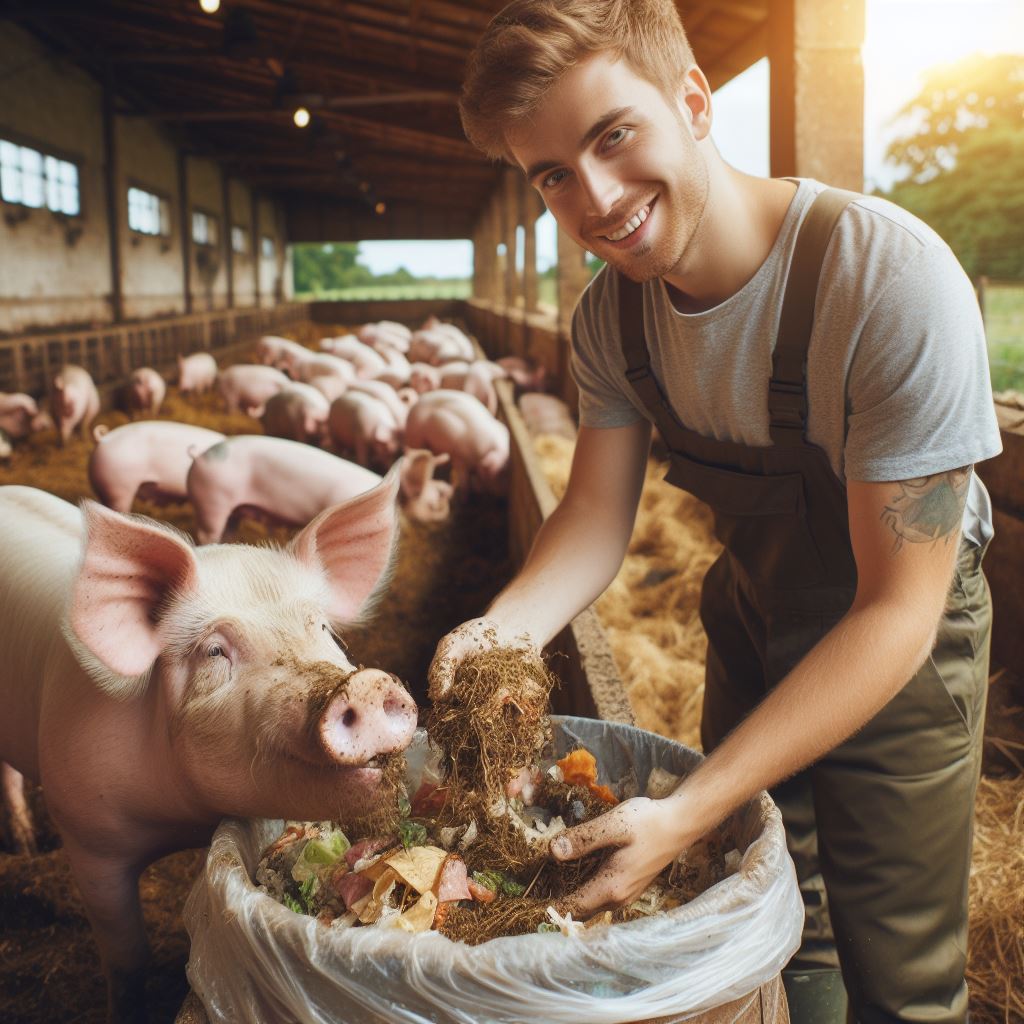Introduction
Sustainable pig farming techniques play a crucial role in ensuring the long-term viability of the pig farming industry.
By adopting sustainable practices, farmers can minimize their negative environmental impact while maintaining profitability.
Importance of sustainable pig farming techniques
Sustainable pig farming techniques are essential to address the environmental challenges associated with pig farming, such as excessive waste production and pollution.
These techniques aim to reduce resource consumption, promote animal welfare, and protect ecosystems.
Definition of sustainable pig farming
Sustainable pig farming refers to the practice of raising pigs in an environmentally friendly and socially responsible manner.
It involves using efficient production methods, minimizing waste generation, optimizing resource utilization, and ensuring the well-being of the animals.
By implementing sustainable pig farming techniques, farmers can minimize the ecological footprint of their operations.
They can adopt measures like proper waste management, nutrient recycling, and the use of renewable energy sources.
Furthermore, sustainable pig farming techniques also prioritize animal welfare.
This involves providing pigs with adequate living space, access to natural light, proper ventilation, and suitable bedding materials.
Such practices improve the pigs’ overall health and well-being.
In addition to environmental and welfare considerations, sustainable pig farming techniques also benefit the farmers economically.
By optimizing resource use, reducing waste, and improving efficiency, farmers can lower production costs and increase profitability.
Therefore, sustainable pig farming techniques are vital for the future of the pig farming industry.
They enable farmers to minimize their environmental impact, promote animal welfare, and ensure economic viability.
Transform Your Agribusiness
Unlock your farm's potential with expert advice tailored to your needs. Get actionable steps that drive real results.
Get StartedBy adopting these practices, we can create a sustainable and responsible pig farming industry for generations to come.
Benefits of Sustainable Pig Farming Techniques
Environmental benefits
Sustainable pig farming techniques have numerous benefits, particularly in terms of the environment, economy, and society.
Reduction in greenhouse gas emissions
The first significant benefit is the reduction in greenhouse gas emissions.
Unlike traditional farming methods, sustainable pig farming techniques prioritize the use of renewable energy sources and implement technologies that minimize the release of harmful gases such as methane.
Preservation of natural resources
Furthermore, these techniques contribute to the preservation of natural resources.
By adopting innovative practices like rotational grazing and nutrient management, farmers can ensure that land, water, and air quality are maintained and even improved.
Prevention of water pollution
In addition, sustainable pig farming techniques help prevent water pollution.
The use of wastewater treatment systems effectively removes harmful pathogens and chemicals before they are discharged into natural water bodies, safeguarding aquatic life and preserving the overall ecosystem.
Economic benefits
Cost savings through efficient resource utilization
Moving on to economic benefits, implementing sustainable pig farming techniques leads to cost savings through efficient resource utilization.
By utilizing energy-efficient equipment and optimizing feed conversion rates, farmers can significantly reduce production expenses, ultimately resulting in financial savings.
Increased profitability through enhanced productivity
Moreover, sustainable farming practices contribute to increased profitability through enhanced productivity.
By ensuring proper animal nutrition, health management, and overall welfare, farmers can maximize growth rates and produce healthier and higher-quality meat products, leading to increased market demand and improved profits.
Improved market reputation and consumer demand
Furthermore, adopting sustainable pig farming techniques can enhance a farm’s market reputation and drive consumer demand.
As consumers increasingly prioritize environmentally friendly and ethically produced goods, farms that can demonstrate their commitment to sustainable practices gain a competitive advantage and attract a larger customer base.
Social benefits
Animal welfare and ethical practices
Sustainable pig farming techniques also offer social benefits.
They prioritize animal welfare and ethical practices, ensuring that pigs are provided with suitable housing, proper nutrition, and access to the outdoors.
This not only improves the well-being of the animals but also meets consumers’ demands for ethically produced food.
Creation of jobs and support for local communities
Additionally, sustainable pig farming techniques contribute to job creation and support for local communities.
As farms embrace sustainable practices, there is a need for skilled labor to manage and implement these techniques, thus creating employment opportunities in rural areas.
This, in turn, boosts the local economy and strengthens the community.
Most importantly, sustainable pig farming techniques bring about a wide range of benefits.
From environmental advantages like reduced greenhouse gas emissions and prevention of water pollution, to economic benefits such as cost savings and increased profitability, and social benefits like animal welfare and job creation, these techniques provide a holistic and sustainable approach to pig farming.
By adopting these practices, farmers can contribute to a greener future while simultaneously reaping numerous advantages for their businesses and communities.
Read: Managing Pig Health: Disease Control
Showcase Your Farming Business
Publish your professional farming services profile on our blog for a one-time fee of $200 and reach a dedicated audience of farmers and agribusiness owners.
Publish Your ProfileSustainable Housing and Animal Welfare
Sustainable pig farming techniques not only benefit the environment but also the welfare of the animals.
In this section, we will discuss the importance of sustainable housing and animal welfare in pig farming.
Designing environmentally-friendly pig housing – Utilizing renewable energy sources
Designing environmentally-friendly pig housing is the first step towards sustainable pig farming.
The design should focus on minimizing energy consumption and reducing environmental impact.
Utilizing renewable energy sources, such as solar panels and wind turbines, can provide clean electricity for powering the pig housing facilities.
These energy sources are not only sustainable but also cost-effective in the long run.
Efficient waste management systems
Efficient waste management systems play a significant role in sustainable pig farming.
Pig waste is a valuable resource that can be converted into biogas through anaerobic digestion.
This biogas can be used as an alternative energy source for heating and electricity generation.
By implementing anaerobic digesters, pig farmers can minimize waste and reduce greenhouse gas emissions.
Enhancing animal welfare in pig housing
Animal welfare is another crucial aspect of sustainable pig farming.
Providing pigs with adequate space and ventilation is essential for their well-being.
Overcrowded conditions can lead to stress, diseases, and behavioral issues.
Proper ventilation ensures good air quality, reduces the risk of respiratory diseases, and promotes healthy growth.
Ensuring proper temperature and lighting conditions
Maintaining proper temperature and lighting conditions in pig housing is also crucial.
Pigs are sensitive to temperature variations, so it is essential to provide them with suitable thermal conditions.
Optimal lighting conditions mimic natural daylight and help regulate the pigs’ circadian rhythm, promoting their overall health and well-being.
Promoting natural behaviors and minimizing stress
Promoting natural behaviors and minimizing stress is paramount in sustainable pig farming.
Pigs are highly intelligent animals with natural instincts for rooting, exploring, and socializing.
Enriching their environment with straw bedding, toys, and structures encourages these natural behaviors, keeping the pigs mentally stimulated and reducing stress levels.
In essence, sustainable housing and animal welfare are integral components of sustainable pig farming techniques.
By designing environmentally-friendly pig housing, utilizing renewable energy sources, implementing efficient waste management systems, and enhancing animal welfare, pig farmers can contribute to a more sustainable and ethical industry.
These practices not only benefit the environment but also promote the well-being of the pigs, ultimately leading to healthier and higher-quality pork production.
Read: Livestock Management: Diverse Animal Care

Feeding Techniques for Sustainability
When it comes to sustainable pig farming, implementing proper feeding techniques is crucial for the overall success of the operation.
Using locally sourced feed ingredients
One way to promote sustainability is by utilizing locally sourced feed ingredients.
By doing so, farmers can reduce the carbon footprint associated with transporting feed from distant locations.
Reducing carbon footprint through minimized transportation
Minimizing transportation not only helps reduce carbon emissions but also decreases the reliance on fossil fuels, contributing to a more sustainable farming practice.
Supporting local agriculture and reducing reliance on imports
By sourcing feed locally, pig farmers can support local agriculture and reduce the need to import feed ingredients from other regions or countries.
This not only boosts local economies but also decreases the carbon footprint associated with long-distance transportation.
Implementing balanced and nutritious diets
Providing pigs with balanced and nutritious diets is essential for their overall health and productivity.
Nutritionists can formulate feed rations that meet the specific nutritional requirements of pigs at different stages of growth.
Optimizing feed conversion efficiency and reducing waste
To achieve sustainability, pig farmers aim to optimize feed conversion efficiency, which refers to the amount of feed consumed in relation to weight gain.
This helps minimize waste and ensures that pigs are efficiently utilizing the nutrients provided in their diets.
Avoiding the use of antibiotics and growth promoters
In sustainable pig farming, the use of antibiotics and growth promoters is avoided whenever possible.
This practice helps prevent the development of antibiotic resistance and promotes the production of high-quality, drug-free pork.
In fact, feeding techniques play a crucial role in sustainable pig farming.
By using locally sourced feed ingredients, reducing transportation, supporting local agriculture, implementing balanced diets, optimizing feed conversion efficiency, and avoiding antibiotics and growth promoters, pig farmers can contribute to a more sustainable and environmentally friendly pig farming industry.
Read: Preventive Health Care for Cattle
Waste Management and Resource Utilization
Implementing efficient manure management systems
Efficient management of pig manure is crucial for maintaining sustainable farming practices.
Showcase Your Farming Business
Publish your professional farming services profile on our blog for a one-time fee of $200 and reach a dedicated audience of farmers and agribusiness owners.
Publish Your ProfileFarmers can adopt various techniques to effectively handle and utilize this waste product.
Anaerobic digesters for biogas production
One effective method is the use of anaerobic digesters, which break down organic matter in manure to produce biogas.
This renewable energy source can be used for various on-farm operations, reducing reliance on non-renewable energy.
Composting for organic fertilizer
Composting offers another eco-friendly solution for pig waste management.
By properly composting manure, farmers can create nutrient-rich organic fertilizer for their crops, reducing the need for synthetic fertilizers.
Repurposing waste products
Pig farmers can further enhance sustainability by finding innovative ways to repurpose waste products.
This not only reduces waste but also creates additional value and revenue streams.
Utilizing pig waste for energy production
Pig waste can serve as a valuable resource for energy production.
Biogas generated from anaerobic digestion can be used for heating, electricity generation, or even as a vehicle fuel.
Producing bioplastics and biofuels from pig by-products
Advanced technologies enable the extraction of valuable components from pig by-products, such as skin and fat, to produce bioplastics and biofuels.
This promotes a circular economy and reduces reliance on petroleum-based products.
By implementing efficient waste management techniques, pig farmers can reduce their environmental footprint and contribute to a more sustainable future.
The adoption of anaerobic digesters allows farmers to harness renewable energy from pig manure while reducing greenhouse gas emissions.
This not only mitigates climate change but also helps farmers cut down on their energy bills.
Composting pig waste not only addresses the challenge of disposal but also enhances soil health by improving its structure and nutrient content.
This, in turn, leads to higher crop yields and reduces the need for chemical fertilizers.
Repurposing waste products adds economic value to pig farming.
For example, pig hair can be used to make brushes and pet toys, while pig bones can be processed to produce gelatin or used in the pharmaceutical industry.
Utilizing pig waste for energy production provides farmers with a renewable energy source that is readily available on the farm.
This reduces dependence on fossil fuels and contributes to a more sustainable energy system.
The production of bioplastics and biofuels from pig by-products not only reduces the environmental impact of the farming industry but also opens up new avenues for economic growth and job creation.
In short, waste management and resource utilization play a crucial role in achieving sustainable pig farming practices.
By implementing efficient systems, such as anaerobic digesters and composting, and repurposing waste products, farmers can reduce their environmental footprint and turn waste into valuable resources.
These practices not only benefit the environment but also contribute to the economic growth and viability of the pig farming industry.
Read: Tech in Farming: Innovations in Livestock Care
Disease Prevention and Health Management
When it comes to sustainable pig farming techniques, disease prevention and health management are of utmost importance.
Implementing biosecurity measures is crucial to maintain the overall health of the herd.
Implementing Biosecurity Measures
In order to prevent the spread of diseases, pig farmers should establish controlled access areas and follow strict hygiene protocols.
This helps in minimizing the risk of bringing pathogens into the farm.
Controlled Access Areas and Hygiene Protocols
By limiting access to the pig farming facilities and implementing proper hygiene protocols, the chances of disease transmission are significantly reduced. This includes ensuring that visitors follow strict biosecurity measures.
Regular Health Screenings and Vaccinations
Regular health screenings and vaccinations play a vital role in preventing the outbreak and spread of diseases among the pig population.
Early detection and timely immunization help in controlling potential diseases.
Emphasizing Preventive Measures over Reactive Treatments
Rather than relying solely on reactive treatments once diseases occur, it is essential to prioritize preventive measures.
This requires a proactive approach to maintain the health and well-being of the pigs.
Reducing Reliance on Antibiotics and Antimicrobials
Overuse of antibiotics and antimicrobials can lead to antibiotic resistance, posing a threat to both animal and human health.
By reducing their reliance and finding alternative solutions, sustainable pig farming can be achieved.
Promoting Natural Immunity through Proper Nutrition and Management
Nutrition and management practices play a significant role in building natural immunity among pigs.
Providing a balanced diet with proper nutritional supplements strengthens their immune system, reducing the risk of diseases.
In review, effective disease prevention and health management are vital for sustainable pig farming.
By implementing biosecurity measures, emphasizing preventive measures, and promoting natural immunity, pig farmers can ensure the overall well-being of their herd.
Showcase Your Farming Business
Publish your professional farming services profile on our blog for a one-time fee of $200 and reach a dedicated audience of farmers and agribusiness owners.
Publish Your ProfileUncover the Details: Smart Barns: Integrating Tech in Livestock Care
Conclusion
Sustainable pig farming techniques play a crucial role in protecting the environment, ensuring animal welfare, and maintaining the long-term viability of the industry.
By adopting and promoting sustainable practices, farmers can minimize the negative impacts of pig farming, such as water pollution, soil degradation, and greenhouse gas emissions.
It is essential for farmers to recognize the importance of sustainable techniques, not only for the health of their businesses but also for the well-being of the planet.
As consumers, we can support sustainable pig farming by consciously choosing to buy products from farms that adhere to ethical and environmentally friendly practices.
By selecting meat from responsibly raised pigs and supporting local, small-scale farmers, we can encourage the shift toward more sustainable pig farming methods.
Together, farmers and consumers have the power to make a positive impact on the future of pig farming, ensuring a healthier and more sustainable industry for generations to come.




